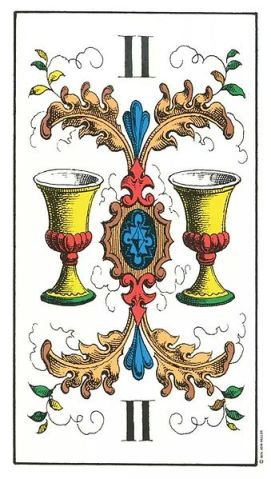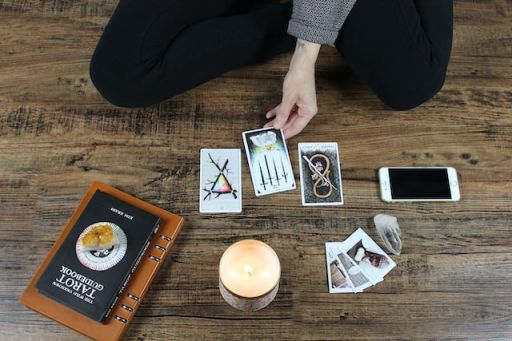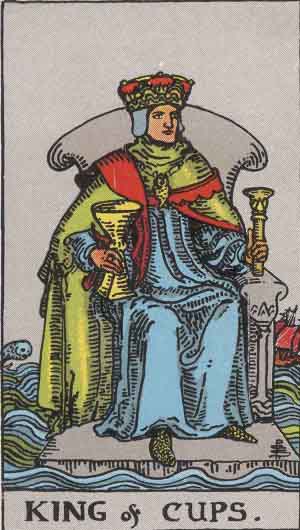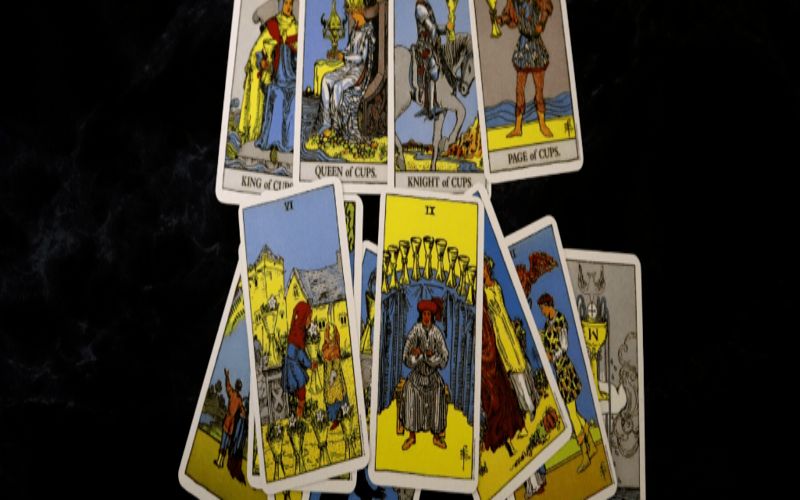The image of water flowing over its container has long been a symbol of joy and abundance. In biblical scripture, the phrase “my cup runneth over” refers to the feeling of safety and care experienced by the faithful believer. Alternatively, being “in your cups” means you’re drunk, possibly evident through the excess feelings you’re sharing.
Like water, our emotions go through phases of stillness and turbulence. Although a small amount of water can seem harmless, a large amount can shape a landscape over time or devastate a shoreline in a sudden rush. A clear, shallow tide pool is a window into another little world; a vast ocean holds many mysteries. In the tarot, the suit of Cups captures all the watery energies of our emotional lives.
When one or more of these 14 cards appear, they indicate times when feelings are important factors or guiding principles. While Wands illustrate creative stages and Pentacles show steps toward stability, the Cups point to various emotional states. These cards nourish your openness to the world and capacity for deep relationships.
General Associations with Cups
What’s your personal relationship with water?

I ask you this question so that you have the opportunity to reflect on the elemental energy of Cups before reading some of the conventional associations for this suit. Your own interpretation of the energy helps you understand which perceptions you bring to readings and how they guide your intuition.
Are you a summer child who loves to be in water any chance you get? Do you appreciate the gift of rain for the garden you tend? Are you afraid of being swept under by a wave? I recommend noting your personal connections as well as the traditional correspondences below.
In the tarot, Cups are traditional symbols of the following:
- The Greek classical element of water
- The astrological water signs Cancer, Scorpio, and Pisces
- The character traits of empathy, intuition, and depth
- Situations involving love, relationships, and healing
- Passive energy
- The season of summer
- The waxing crescent moon phase
- Action happening within months
- The direction of west
Of course, many tarot practitioners have different associations. Some variation is expected in a divinatory practice that incorporates so many traditions and approaches. If you’re a beginner, you can practice by applying basic symbolism. As you grow in your practice, it’s normal to adjust the meanings according to your experience and the context.
Brief History of the Suit of Cups
The standard tarot deck today still resembles the card games that influenced its design.
Likely in the late 14th century, Middle Eastern playing cards that included a suit of cups arrived in Europe through trade. Shortly after, variations of the four suits in this game appeared in different European countries.
The cups became the hearts in the medieval French-suited deck, which is recognized as the standard playing deck today. The symbolic link between the Cups and feelings (“hearts”) is clear. In the 15th century, wealthy Italian families commissioned the first known 78-card tarot deck with the Major Arcana in addition to the standard four suits of the Minor Arcana.
Until the 18th century, tarot decks were widely used for gameplay rather than divination. At the same time, many medieval European countries outlawed card games, perhaps contributing to negative associations with tarot cards. When people later began using decks explicitly for divination, the Cups retained a relationship with the clergy in feudal European society. Although few readers would so literally read Cups as signifying priests, the suit still suggests the spiritual guidance of that social class.
Positive Aspects of Cups
Some wonderful features of this suit include compassion and receptivity. Cups people can be in touch with their feelings and highly attuned to the feelings of others. A career or situation that requires strong relationships befits a watery type, who naturally understands how to make people feel at ease. For instance, you might find this personality drawn to jobs in counseling, teaching, or the arts.
Another strength is adaptability. Think of how water travels through the water cycle: it moves into the clouds and returns to earth as precipitation. It seeps into the ground where it can remain for long periods and nourish growth. This easy movement through so many parts of the ecosystem relates to the qualities of flexibility, gentle influence, and high psychic energy.
Finally, there’s a distinct experience of joy that comes with the Cups. Many cards in this suit—such as the Ace, the Three, and the Ten—bring overwhelming pleasure. Often, this pleasure isn’t fleeting but feels abiding, fed by a connection to the collective and the sense of cosmic safety that can come from that connection.
Negative Aspects of Cups
Although our feelings absolutely inform our decisions, unbalanced water energy leads to inaction. Turning inward is an important way to move with self-awareness through the world, but too much time spent contemplating can prevent us from actually moving.
There’s also a risk of passivity, or yielding to strong energies or influences in the environment; that’s the beautiful quality of adaptability gone astray. This energy could be overly accommodating to the needs of others above the self, or it might simply slip into apathy (which we see in the Four of Cups).
As emotional as we all are, we can’t act through only desire and impulse. An abundance of Cups cards may contain a lesson about the downsides of emotional reactivity and irrationality. As the tarot reader, you can consider surrounding cards to determine whether the querent’s emotions are serving or hindering them. Sometimes, the cards point to someone else whose overemotional influence is detrimental.
Meaning of Cups in a Reading

When this suit is dominant, your situation is influenced by relationships, and your feelings might matter more than usual to your decision-making. In a reading, Cups draw our attention to the following:
- Important friendships
- Loyal partnerships
- Supportive groups or social collectives
- Grief or mourning
- Home and children
- Healing processes or what needs healing
- Temptations
- Simple pleasures
- Spiritual journeying
- Changes of heart and self-understanding
- What brings joy
The other suits of the Minor Arcana add context to the emotional situation. The appearance of Pentacles might suggest that a certain relationship is contributing material security for the querent. The suit of Wands could indicate a creative partnership. Swords, depending on the cards, might mean agreement or tension between the head and the heart. As always, your intuition will guide you.
In a Love Reading
We love to see Cups show up in our love readings! The Ace, Two, and Ten are especially supportive of intimacy. The appearance of this suit usually indicates an established relationship that might be deepening, growing, or otherwise changing. This is why this suit is so traditionally associated with falling in love.
When the Cups illustrate the personality of a lover or friend, that person is likely to be nurturing and encouraging. There’s space in the relationship for emotional sharing, as the person is especially good at holding space for you.
There are, of course, some tarot cards (the Five and Eight especially come to mind) that could suggest pain in relationships or the home. These aren’t necessarily bad omens, but they might indicate a need for healing or intentional communication.
In a Work Reading
Unsurprisingly, Cups in a work reading again show the importance of relationships in the workplace. Perhaps your manager is a nurturing influence, or you have an important alliance with one of your coworkers.
The suit can also highlight your feelings about the job itself. For example, these cards show your level of motivation or how you show up in your role. The Four might mean you lack interest or appear introverted. The Seven might mean you’re having difficulty making a decision, and your coworkers could perceive you as squandering opportunities.
As with love readings, Cups in work readings can show whether you’re satisfied or dissatisfied with a situation even if you’re not taking action yet. When you’re reading a querent’s tarot, you can use your understanding of the overall emotional impression to help them make a decision or find clarity.
Journey of the Cups
In numerical order, the ten pip cards show how emotions flow and change as they guide us toward satisfaction. As you review the table below, refer to the imagery on your own physical cards. You can use the Rider-Waite deck, which I use for basic references, or work with whichever deck clearly communicates with you at the moment.
Although you could weave many stories out of the Cups cards, I’ve provided an example for a querent who’s accepted a placement to study a healing art in a new town.
| Card | Keywords | Story Meaning: Example |
| Ace | Joy, love | You receive the offer with an open heart, believing that it has great potential to bring fulfilling connections. |
| Two | Beginning of the relationship, alignment | You begin a friendship with someone who has a different perspective during training; you help one another. |
| Three | Celebration, community | The training group is supportive and helps you grow in a place that’s starting to feel more like home. |
| Four | Retreat, apathy | You feel stagnant in your growth, causing you to question your decision to leave home. |
| Five | Loss, grief | You miss several important milestones for your friends and family back home and dwell on the loss of that community. |
| Six | Nostalgia, healing, home | You take steps to reconnect with your past, but you also realize you need to shift your attitude toward the future. |
| Seven | Fantasy, possibility, temptation | There are several opportunities for growth in your field. Which has the most potential for you personally? |
| Eight | Spiritual journey, leaving | After deliberation, you realize the best opportunity requires you to make another move away from both your new and old communities. |
| Nine | Wish fulfillment, simple pleasures | You get the job you want! You continue to find meaning and joy in your new community. |
| Ten | Deep fulfillment | You feel held by your personal and professional community, and your friend from training has grown into a life partner. You nurture relationships with people far away and experience a feeling of large-scale connection. |
Court Cards of Cups
When a court card in this suit appears, you might be influenced by someone with the astrological sign Cancer, Scorpio, or Pisces. Your significator (the card that represents you) might be in the Cups court if you’re a water sign. The cards also stand for people of other signs who have especially watery qualities.

Note that gender and age aren’t necessarily indicated by the court cards, even though some readers might interpret them this way. A person of any gender or age can appear as any of the court cards.
Page of Cups
The Page is the dreamer. This person is getting in touch with their artistic or psychic abilities, beginning to develop these qualities but not necessarily with urgency. This Page also appears when you receive news about a personal relationship.
Knight of Cups
This Knight of Cups conveys a change of heart, often bringing a deeper understanding of the self. There’s a romantic quality to this figure, and he’s someone who wants to believe in transformative ideals. If the Knight becomes too absorbed in himself, he might not act. Yet he also has the potential to influence his community by expressing himself authentically.
Queen of Cups
The Queen of Cups has a strong vision of love. They’re deeply connected to themselves and open to the gift of love, so they bring these qualities to the world around them. When the Queen appears, they’re often a person who nurtures creative action and self-expression through love and validation.
King of Cups
The King of Cups displays kindness and balanced consideration in positions of leadership. In the best situations, this King expresses emotions responsibly and encourages others to do so too, like a mediator would. However, the flow of this suit isn’t always comfortable in positions of authority, so this King might have had to compromise or repress their inner life. In less ideal circumstances, this person is emotionally reactive or in denial, making them less trustworthy.
Questions of the Cups
The Cups show us how our emotions affect our perception of the world. The following questions can help you reflect on this suit’s energy in a reading:
- What makes me feel loved?
- Do I experience joy in my life? Why or why not?
- Who or what do I love most? What is my relationship to these people or things?
- Where do I find the most pleasure?
- Where does sadness or pain exist in my relationships?
- What are my deepest desires?
- How do I share my inner life with the world?
Getting started with tarot
If you are new to tarot a great place to start is with our beginners guide to tarot and having a look at some of the easy spreads in our three card spreads guide.
Learn the Tarot with Online Flash Cards
Are you looking to dive into the world of tarot and master the meaning of each card? You should check out our post, “Learn The Tarot Cards – Online Flash Cards” by our own Tarot expert Ersa Fay. With interactive flash cards covering all 78 cards in the tarot, both the Minor and Major Arcana, you will learn key facts and the symbolism and meanings associated with each card.
By using these flash cards, you’ll become more comfortable with performing your own readings and enhance your journey into the world of tarot.
In the post, Ersa focuses on the iconic Rider-Waite-Smith tarot deck, known for its rich imagery and profound symbolism. The captivating illustrations in this deck draw from various sources such as mythology, astrology, alchemy, and the Kabbalah, creating a visual language that resonates deeply with the human psyche. So, if you’re ready to start learning, don’t miss out on this fantastic resource. We hope you find it useful and remember to have fun with it!
Featured Image Credit: hidden numerology, CC BY-SA 4.0, via Wikimedia Commons

